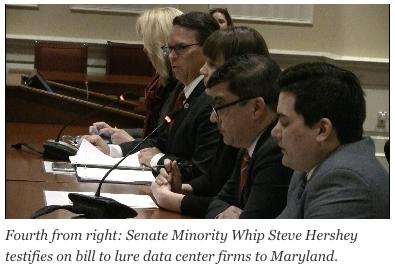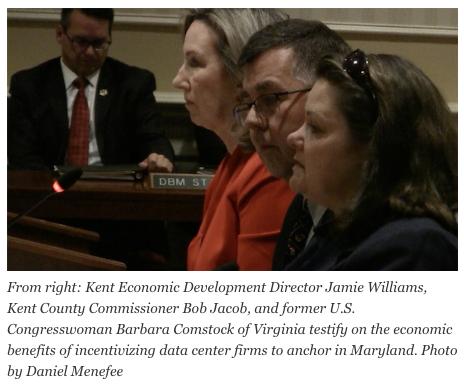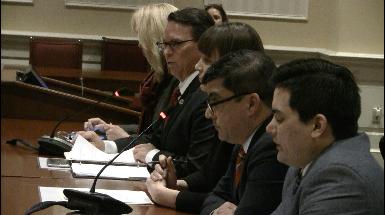 A bipartisan bill sponsored by Senate Minority Whip Steve Hershey and Prince George’s Sen. Doug Peters, a Democrat, could make Maryland more competitive with surrounding states that have successfully used tax incentives to lure data center companies.
A bipartisan bill sponsored by Senate Minority Whip Steve Hershey and Prince George’s Sen. Doug Peters, a Democrat, could make Maryland more competitive with surrounding states that have successfully used tax incentives to lure data center companies.
“This is a tax exemption bill that we feel is necessary to begin attracting multi-million dollar data center facilities to Maryland,” Hershey, R-Queen Anne’s, said before the Senate Budget and Tax Committee on Wednesday. “We are not asking to dig into the Maryland coffers to give anything away, we’re simply asking the committee to make a thoughtful economic decision.”
The bill would offer data centers exemptions to Maryland’s personal property and sales and use tax, provided they invest $5 million within three years of filing for the exemption — and hire at least five personnel earning 1.5 times the state’s minimum wage.
The investment requirement drops to $2 million in the Tier I counties of Allegany, Baltimore City Caroline, Dorchester, Garrett, Kent, Somerset, Washington, Wicomico and Worcester–because these counties have unemployment rates the exceed 150 percent of the state average.
“Other states have recognized the valuable economic impact these facilities bring to local economies and have changed their tax policies to incentivize these companies to come to their states,” Hershey said. “Maryland is not leading, we’re not even in the game.”
 He said the demand for new data centers is increasing and that other states have seen economic rewards from providing tax incentives to data center firms. The bill would also allow a local jurisdiction to reduce the percentage of its own personal property tax to attract data centers.
He said the demand for new data centers is increasing and that other states have seen economic rewards from providing tax incentives to data center firms. The bill would also allow a local jurisdiction to reduce the percentage of its own personal property tax to attract data centers.
Former U.S Congresswoman Barbara Comstock of Virginia also testified before the committee and spoke of her state’s tax revenue windfall from data centers.
She said in 2012 Virginia updated its incentives for data centers and tax revenue in Loudon County alone soared from $50 million in 2012 to $350 million in 2020.
She said there has not been a year where the taxpayers lost any money.
Hershey commended the efforts of the Kent County Economic Development Office for requesting the bill, which will have a statewide benefit.
Kent Economic Development Director Jamie Williams said the tax incentives would be the first step in attracting data centers.
“The need for data storage and processing increases daily,” she told the committee. “It’s not a matter of if these data centers will be built, it is a matter of where.”
Kent County Commissioner Bob Jacob said that new data centers would greatly benefit from the county’s recent $7 million investment in an open fiber-optic network. He said the 150-mile network was recently completed without state funds.
He told the committee that Loudon County, VA had increased its commercial tax base 15 percent while increasing funding for education.
“They did it with the attraction of data centers and it was possible in part from the sales and use tax exemption,” he said. “Maryland would like an opportunity to share in a small portion of that industry.”
Dee Anna Sobczak, CEO of Kent FIBER Optic Systems, said the need for data centers is growing 40 percent a year–and will continue at the current pace for the next decade.
She said data centers draw other tech companies that want to be near them.
“There are many areas in the state that are prime for data centers, but without the incentives, they will never come,” she said. She said it was hard for Maryland to be competitive with tax-free Delaware and Virginia, “the data center capital of the world.”
There are currently 35 other states offering tax incentives to attract data centers, she said.
Hershey’s co-sponsor, Sen. Doug Peters, said Prince George’s County is also well suited to host data centers.
“This bill is important because we need to be competitive like neighboring states in order to attract data center clients to Maryland,” he said in an email to the Spy. “Prince George’s County is perfectly positioned to house these data centers in its numerous industrial complexes.”
Del. Jay Jacobs, R-Kent, has a cross-filed bill in the House of Delegates that has also won bipartisan support. A hearing is scheduled for March 6.
“Our Legislators should act on this bill quickly to ensure companies can invest in Maryland communities on an equal footing with competing states,” said Chestertown Ward 2 Councilman Tom Herz, who campaigned on the benefits of data centers tapping into Kent’s fiber network. “Doing so will spur economic growth in both our rural counties and urban centers.”
There was no testimony in opposition to the bill.
Don’t miss the latest! You can subscribe to The Talbot Spy‘s free Daily Intelligence Report here.



Write a Letter to the Editor on this Article
We encourage readers to offer their point of view on this article by submitting the following form. Editing is sometimes necessary and is done at the discretion of the editorial staff.